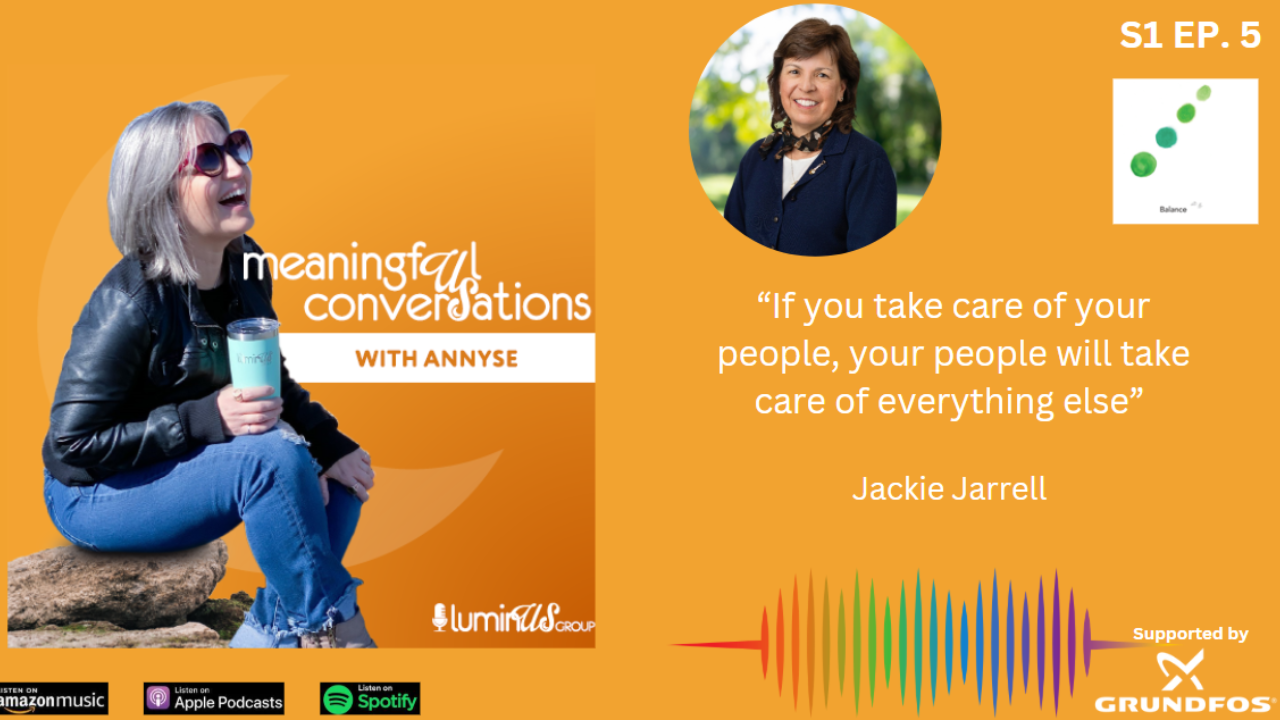Rethinking Leadership, Balance, and Human-Centered Culture in the Water Sector

Featuring Jackie Jarrell, Principal Consultant, Raftelis
In a recent episode of Meaningful Conversations, I had the privilege of speaking with Jackie Jarrell, a passionate and heart-centered leader with deep roots in the utility and water sectors. Jackie has spent much of her career working at Charlotte Water and is now a Principal Consultant at Raftelis and a WEF Fellow.
She brings a rare blend of technical expertise and visionary thinking to the question of how we build workplaces that work for people, not just systems.
Together, we explored the quiet—but profound—cultural shifts happening across the sector, and what it means to lead with humanity, curiosity, and courage.
What the “Balance” Card Revealed
During our conversation, Jackie drew a Balance card—part of a reflective prompt deck we used to spark dialogue. Her first instinct was to talk about how challenging balance is for those working in utilities.
“The work is so important—and often, it becomes all-consuming,” she reflected. “But the future offers opportunities to shift that. We have tools, technology, and new perspectives available to us. We can reimagine what it means to support the people behind the systems.”
Jackie emphasized how essential it is to bring in diverse perspectives—from HR and IT to people with lived experience in communities—to redesign processes that foster well-being and sustainability. Balance isn’t just a personal issue—it’s an organizational strategy.
Leadership Is Not a Job Title
You don’t need to be a manager to be a leader. Leadership is a mindset, a skillset, and a set of daily practices. We all lead our own lives—and we need leaders at every level of the organization.
This vision of leadership invites all of us to show up more intentionally—whether that means asking better questions, being willing to challenge assumptions, or simply creating space for others to speak.
Silos Are Often Just Thoughts
One of the most memorable takeaways from our talk was our insight that many organizational silos are not fixed structures—they're mental habits.
“We think, ‘I can’t reach out to someone senior,’ or ‘I don’t have a voice here.’ But when we surface those assumptions and talk about how work really gets done, we start dissolving those barriers.”
This is the “unwritten structure”—the informal, human side of how things operate beneath the org chart. When we name and examine this dynamic, we open possibilities for collaboration, innovation, and connection.
A New Culture of Care
Throughout our conversation, it was clear that Jackie is part of a growing movement to re-center humanity within technical fields. Whether she’s advising utilities, coaching teams, or mentoring emerging leaders, her work is rooted in care—for people, for purpose, and for what’s possible.
This kind of leadership is not flashy or hierarchical. It’s intentional, heart-led, and deeply needed.
If you're working in the water sector—or any sector undergoing transformation—Jackie’s message is clear: the future will be shaped by those who are willing to show up as whole humans, ready to listen, collaborate, and lead with purpose.
